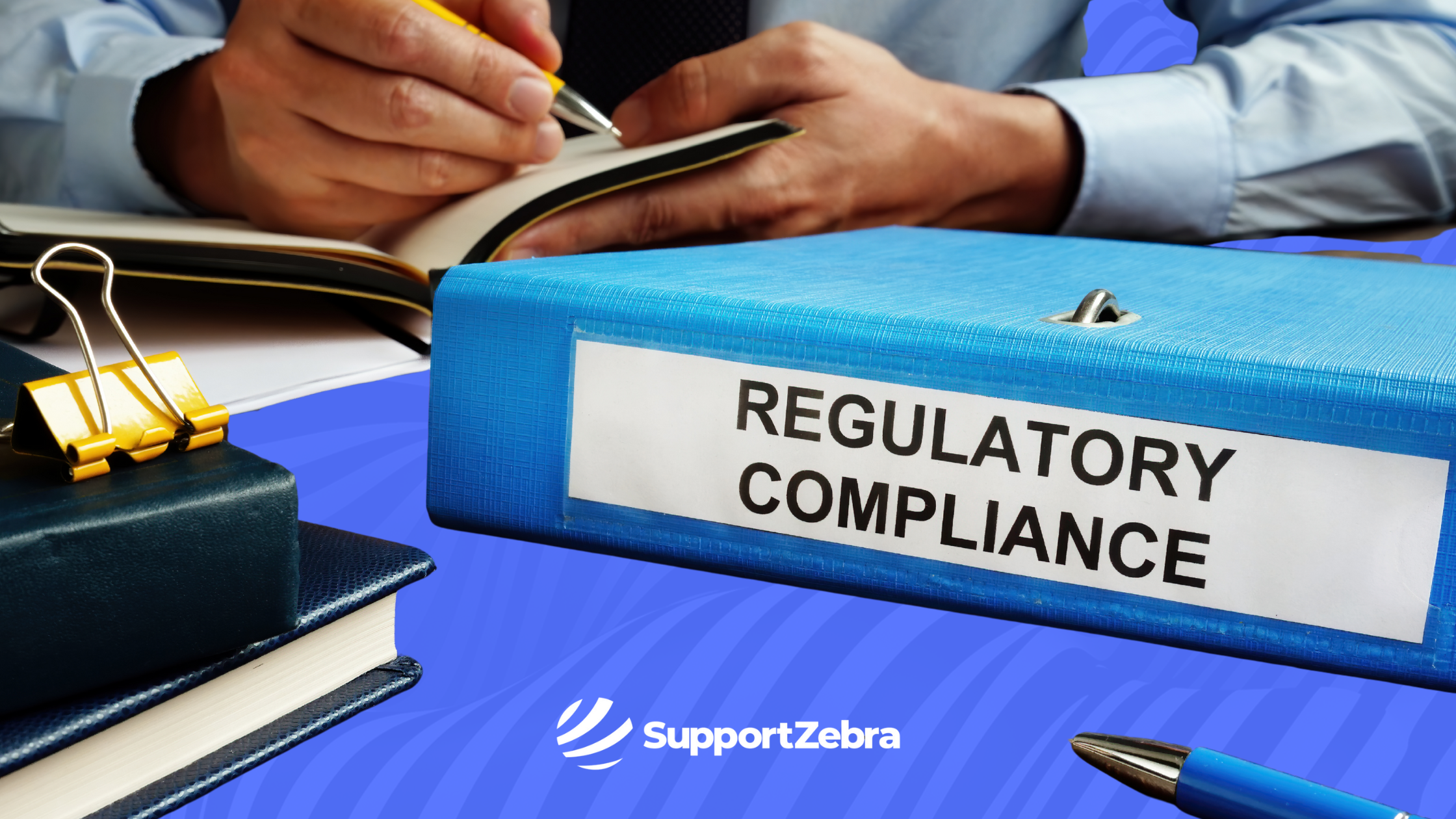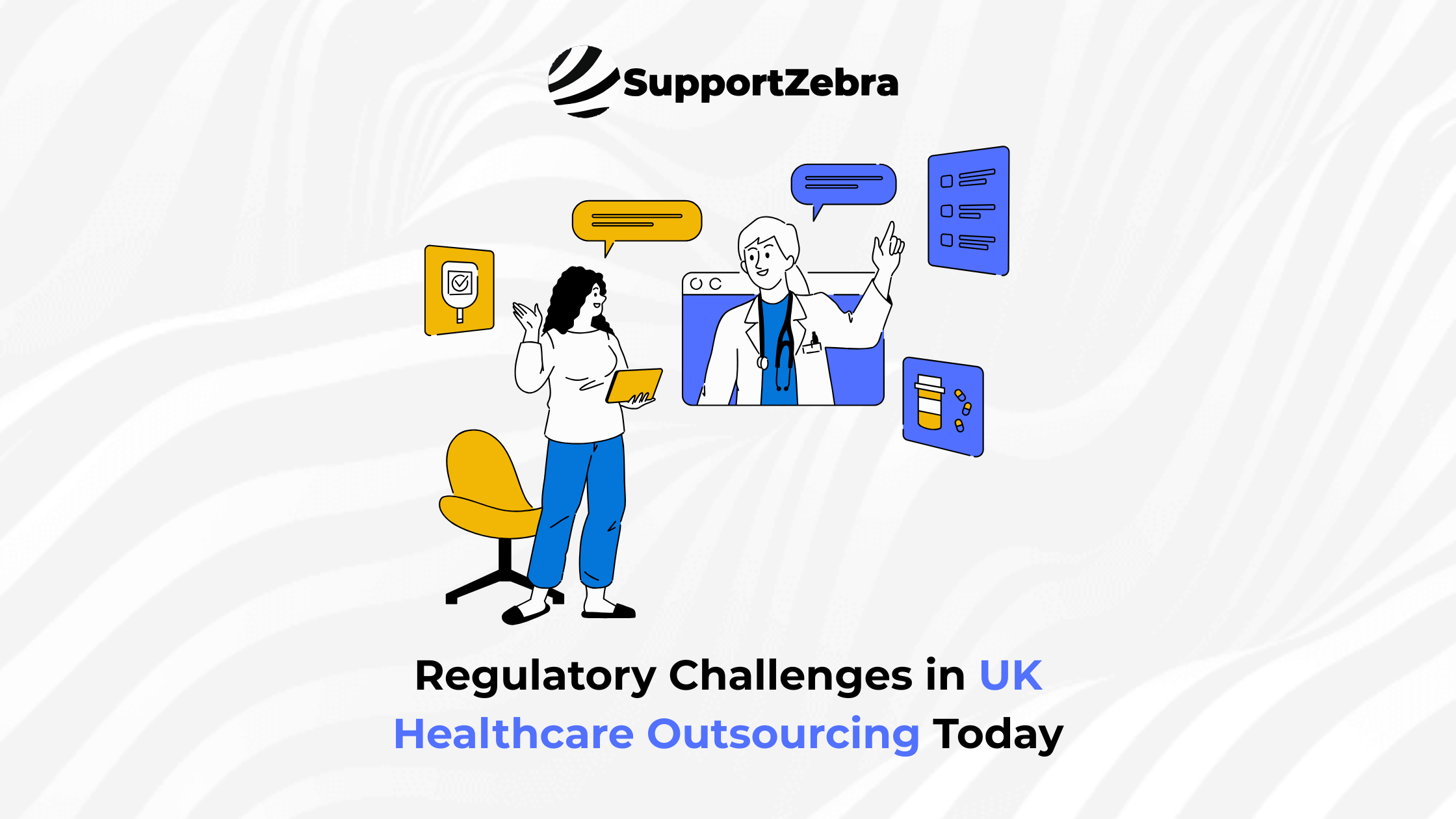Regulatory Hurdles in UK Healthcare Outsourcing
Key Takeaways:
- Strict rules on data, safety, and fair procurement shape UK healthcare outsourcing.
- Failing to comply can lead to fines, service bans, and loss of patient trust.
- Cross-border outsourcing adds extra risks with data protection and regulatory alignment.
- SupportZebra helps providers stay compliant while keeping patient care strong.
Outsourcing in UK healthcare can feel like walking through a maze. Rules keep changing, and it is easy to feel lost. For many providers, this means more stress, rising costs, and slower services. Ignoring these challenges only makes things worse, leading to delays in care and unhappy patients.
This is where we step in. We help you handle the rules with ease, so you can focus on what matters most, giving patients the care they deserve.
What Are the Main Regulations That Affect Healthcare Outsourcing in the UK?
Strict laws shape healthcare outsourcing in the UK. These rules are designed to protect patient safety, data security, and service quality. Providers who outsource any part of their operations need to know about:
- General Data Protection Regulation (GDPR) – Protects patient data and sets out how information can be stored and shared.
- Health and Social Care Act 2012 – Defines how health services should be managed, monitored, and held accountable.
- Care Quality Commission (CQC) Standards – Requires providers to meet strict safety and quality checks.
- National Health Service (NHS) Procurement Rules – Ensures outsourcing deals are fair, transparent, and cost-effective.
Failing to meet these rules can result in legal fines, loss of trust, or even a ban on operations. This is why outsourcing in healthcare needs close oversight from the start.

Why Is Data Protection Such a Big Challenge in Healthcare Outsourcing?
Patient data is one of the most sensitive types of information. If it falls into the wrong hands, it can cause serious harm, both for patients and healthcare providers. Outsourcing often involves sharing data with third parties, which makes protection harder.
The challenges include:
- Making sure all outsourced partners follow GDPR at all times.
- Preventing unauthorised access to patient files.
- Avoiding data breaches that can lead to heavy fines and damaged reputations.
- Training staff on secure data handling.
Healthcare providers cannot afford mistakes in this area. One breach can lead to lost trust and legal action. This is why data protection remains one of the toughest hurdles in outsourcing.
How Does Outsourcing Impact Patient Safety and Care Quality?
Some worry that outsourcing may reduce the quality of care. This happens if third parties are not held to the same standards as NHS or in-house staff. Regulations exist to make sure patients stay safe, but keeping up with them takes time and effort.
Key risks include:
- Delays in treatment occur if outsourced providers are not well-managed.
- Errors in patient records occur when systems do not match.
- Uneven service levels when external partners lack training or supervision.
The implication is clear: without strict oversight, outsourcing can cause harm rather than provide help. Providers must work only with partners who follow all safety rules and maintain high service levels.
What Happens if a Healthcare Provider Fails to Meet Outsourcing Regulations?
The costs of non-compliance are serious. Providers who fail to meet regulations can face:
- Legal fines that drain budgets.
- Service bans that stop them from working with the NHS or other partners.
- Loss of patient trust that is hard to rebuild.
- Damage to reputation that affects future contracts.
Ignoring regulations is not an option. The risks are too high. Providers must see compliance as a core part of their outsourcing strategy, not as an afterthought.
How Do Regulations Affect Cross-Border Outsourcing in Healthcare?
Some UK providers outsource services overseas to reduce costs. But this creates new challenges. Different countries have different laws, and not all match UK standards. This can make compliance harder.
Issues include:
- Making sure patient data sent abroad still follows GDPR.
- Checking that overseas partners meet CQC and NHS standards.
- Managing time zone and cultural differences without harming patient service.
Cross-border outsourcing can still work well, but only with strong agreements and constant checks. Providers must always confirm that overseas partners can meet UK rules before sharing any responsibility with them.
Why Are Procurement Rules a Major Obstacle in UK Healthcare Outsourcing?
NHS and other UK health providers must follow strict rules when choosing outsourcing partners. These rules are meant to keep the process fair and transparent. But they also make it more complex and time-consuming.
Challenges include:
- Lengthy tender processes that delay deals.
- Heavy paperwork that drains resources.
- Strict value-for-money checks that can block some providers.
- Ongoing audits to ensure contracts remain fair.
While these rules protect patients and taxpayers, they can frustrate providers who need fast solutions. Outsourcing partners must be prepared to meet these demands from day one.
How Do Regulatory Changes Create Problems for Healthcare Outsourcing?
The rules around UK healthcare outsourcing are not fixed. They change over time, often in response to new risks, technology, or political priorities. This can cause sudden disruption for providers.
Problems caused by shifting regulations:
- Extra costs to update systems and processes.
- Delays while staff are retrained.
- Uncertainty about long-term contracts.
- Confusion when partners operate under different interpretations of the same rule.
Staying ahead of change is vital. Providers who wait until the last minute may struggle to adapt, putting both their services and their patients at risk.

How Can Healthcare Providers Make Compliance Easier When Outsourcing?
Meeting all rules may seem overwhelming, but it is possible with the right steps. Providers can simplify compliance by:
- Choosing outsourcing partners with proven experience in healthcare.
- Running regular audits to check processes meet standards.
- Offering staff ongoing training in compliance and data protection.
- Using secure systems that meet NHS and GDPR requirements.
- Building strong contracts that hold partners accountable.
Compliance should not be treated as a one-time task. It is an ongoing process that protects both patients and providers.
Why Choose SupportZebra for Handling UK Healthcare Outsourcing Regulations?
Navigating UK healthcare outsourcing rules can be tough, but you do not have to face it alone. SupportZebra helps providers stay compliant while still gaining the benefits of outsourcing.
Here is why healthcare providers trust SupportZebra:
- Deep compliance expertise – We know GDPR, CQC standards, and NHS procurement rules.
- Strong data security – Our systems protect patient information at every step.
- Flexible outsourcing models – We adapt to meet the unique needs of UK healthcare.
- Constant oversight – We monitor processes to prevent errors and maintain high quality.
With SupportZebra, providers can reduce stress, cut costs, and still meet the strict rules of UK healthcare. We make sure compliance is not a barrier, but a strength.
✅ Ready to simplify healthcare outsourcing in the UK? Reach out to SupportZebra today and see how we can help you stay compliant while delivering better patient care.

